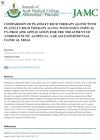 January 2022 in “Journal of Clinical and Diagnostic Research”
January 2022 in “Journal of Clinical and Diagnostic Research” Using platelet-rich plasma injections and biotin pills together significantly increases hair regrowth in men with hair loss.
4 citations,
November 2017 in “PubMed” Miracle fruit seed oil significantly reduces hair breakage in women with damaged hair.
[object Object] 1 citations,
February 2017 in “PubMed” The supplement may help hair growth and is safe, but more research is needed.
 June 2023 in “Brazilian Journal of Health Review”
June 2023 in “Brazilian Journal of Health Review” Common baldness is a hereditary condition that can be treated with medications or surgery to prevent progression and improve self-esteem.

Plucked hair follicles grow faster than conventional ones, making them a potentially better option for hair transplants.
 42 citations,
August 2013 in “International Journal of Women's Health”
42 citations,
August 2013 in “International Journal of Women's Health” Female pattern hair loss is caused by multiple factors and while treatments like topical minoxidil, hormone therapy, and low-level light therapy can help, none can fully cure it.
35 citations,
October 2019 in “Journal of pediatric health care” Children with darker skin tones can have specific skin conditions that need tailored treatments.
 10 citations,
March 2015 in “PubMed”
10 citations,
March 2015 in “PubMed” Scalp micropigmentation, a cosmetic tattoo technique, is a promising non-surgical treatment for hair and scalp deformities, despite potential complications.
 10 citations,
December 2014 in “PubMed”
10 citations,
December 2014 in “PubMed” Finasteride, a hair loss drug, may cause sexual dysfunction and depression, but these effects are usually temporary and the drug is generally safe. More research is needed.
[object Object]  5 citations,
October 2021 in “BioMed Research International”
5 citations,
October 2021 in “BioMed Research International” Noncrosslinked hyaluronic acid helps human hair cells grow and could be a potential hair loss treatment.
5 citations,
July 2020 in “PubMed” Both oral contraceptives reduced hirsutism in PCOS patients, but adding metformin showed no extra benefit.
 4 citations,
September 2016 in “PubMed”
4 citations,
September 2016 in “PubMed” Using platelet-rich fibrin matrix with hair transplant techniques helps in hair regrowth in male baldness patients.
 3 citations,
August 2020 in “PubMed”
3 citations,
August 2020 in “PubMed” Some natural ingredients like onion juice, rosemary oil, and pumpkin seed oil may help with hair growth and reducing hair loss.
 2 citations,
May 2021 in “Stem Cells International”
2 citations,
May 2021 in “Stem Cells International” Human pluripotent stem cells could be used to make platelets for medical use, but safety, effectiveness, and cost issues need to be resolved.
 2 citations,
March 2020 in “PubMed”
2 citations,
March 2020 in “PubMed” Biotin deficiency is not a major cause of Telogen Effluvium hair loss.
2 citations,
January 2020 in “Evidence-based Complementary and Alternative Medicine” Hataedock treatment improved skin health and reduced atopic dermatitis symptoms by enhancing the skin barrier and reducing inflammation.
 2 citations,
August 2014 in “PubMed”
2 citations,
August 2014 in “PubMed” Losartan may help treat Postural Orthostatic Tachycardia Syndrome (POTS) symptoms.
 2 citations,
June 2012 in “PubMed”
2 citations,
June 2012 in “PubMed” The document concludes that central centrifugal cicatricial alopecia (CCCA) should be considered in African American men with vertex hair loss and scalp symptoms, and that prompt diagnosis and treatment can slow disease progression.
1 citations,
August 2022 in “BioMed Research International” Chitosan-decorated nanoparticles can improve skin delivery and reduce side effects of finasteride.
1 citations,
December 2019 in “Journal of skin and stem cell” PRP shows promise for short-term hair growth, especially in young men.
 June 2024 in “Journal of Ayub Medical College Abbottabad”
June 2024 in “Journal of Ayub Medical College Abbottabad” Combining PRP with Procapil is more effective for hair loss treatment than PRP alone.
 December 2023 in “PubMed”
December 2023 in “PubMed” Both single-spin and double-spin PRP methods effectively treat hair loss, with single-spin slightly increasing platelet count more.
 August 2023 in “Bioengineering”
August 2023 in “Bioengineering” Bioprinting could greatly improve health outcomes but faces challenges like material choice and ensuring long-term survival of printed tissues.
March 2023 in “Asian Journal of Beauty and Cosmetology” HX109 herbal extract helps hair grow by boosting cell growth and reducing cell death.
August 2022 in “Regenerative Medicine” Adipose-derived stem cells show promise for cosmetic treatments but need more research.
 January 2022 in “International Journal of Nutrology”
January 2022 in “International Journal of Nutrology” Diet and nutrients, including lycopene from tomatoes and hydroquinone from wheat, can help control melasma, a skin condition.
 October 2020 in “Authorea (Authorea)”
October 2020 in “Authorea (Authorea)” Men and women react differently to opioids, with hormones potentially influencing these differences.
January 2023 in “Applied sciences” Equisetum debile extracts may help with skin whitening, anti-wrinkle, and anti-hair loss treatments.
December 2021 in “Journal of V. N. Karazin Kharkiv National University: Series Medicine” The treatment improved hair health in women with androgenetic alopecia.
14 citations,
August 2020 in “Journal of cosmetic dermatology” Experts recommend using PN-HPT™ for skin rejuvenation in various body areas but have less agreement on initial facial treatment cycles.

















